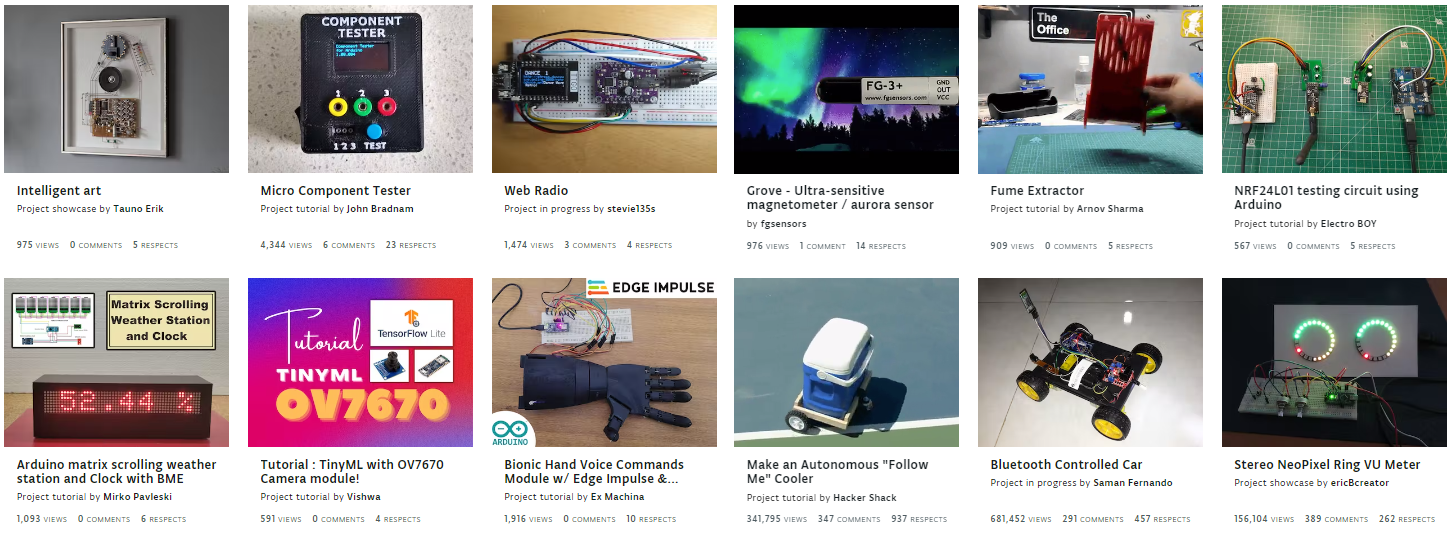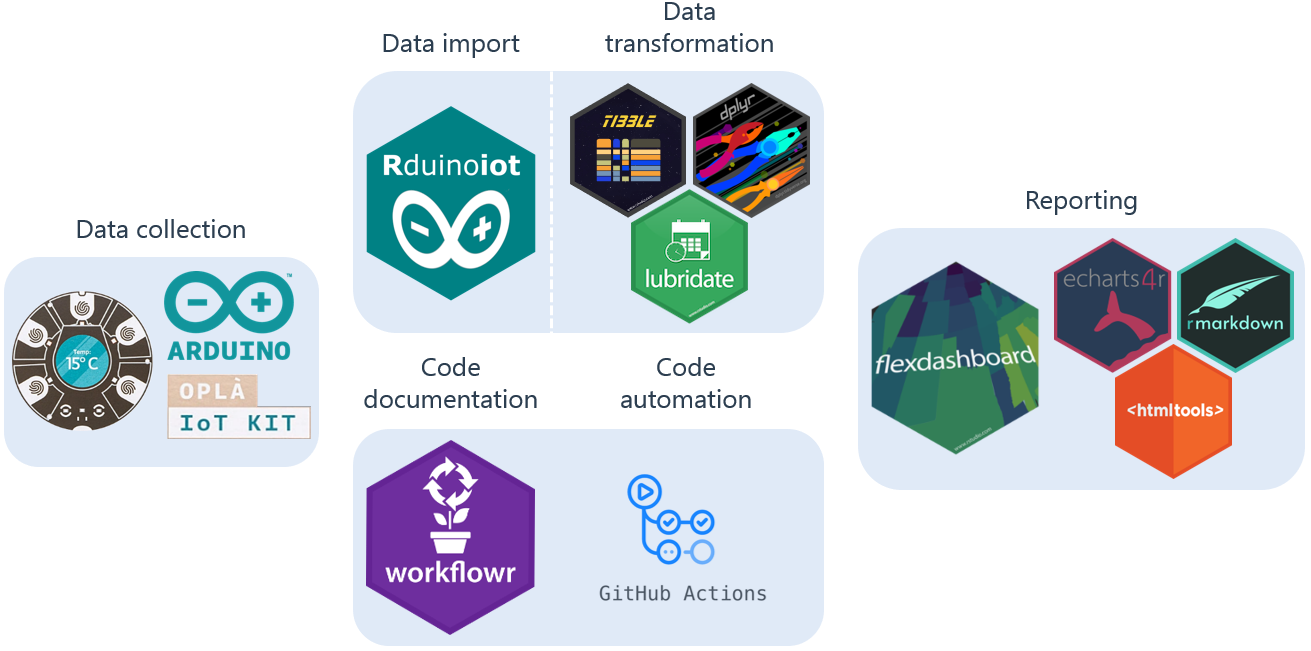Using R to visualize Arduino-iot weather sensor data
Last updated: 2022-09-30
Checks: 7 0
Knit directory: Rduinoiot-analysis/
This reproducible R Markdown analysis was created with workflowr (version 1.7.0). The Checks tab describes the reproducibility checks that were applied when the results were created. The Past versions tab lists the development history.
Great! Since the R Markdown file has been committed to the Git repository, you know the exact version of the code that produced these results.
Great job! The global environment was empty. Objects defined in the global environment can affect the analysis in your R Markdown file in unknown ways. For reproduciblity it’s best to always run the code in an empty environment.
The command set.seed(20220923) was run prior to running the code in the R Markdown file. Setting a seed ensures that any results that rely on randomness, e.g. subsampling or permutations, are reproducible.
Great job! Recording the operating system, R version, and package versions is critical for reproducibility.
Nice! There were no cached chunks for this analysis, so you can be confident that you successfully produced the results during this run.
Great job! Using relative paths to the files within your workflowr project makes it easier to run your code on other machines.
Great! You are using Git for version control. Tracking code development and connecting the code version to the results is critical for reproducibility.
The results in this page were generated with repository version d3e8e59. See the Past versions tab to see a history of the changes made to the R Markdown and HTML files.
Note that you need to be careful to ensure that all relevant files for the analysis have been committed to Git prior to generating the results (you can use wflow_publish or wflow_git_commit). workflowr only checks the R Markdown file, but you know if there are other scripts or data files that it depends on. Below is the status of the Git repository when the results were generated:
Ignored files:
Ignored: .Rhistory
Ignored: .Rproj.user/
Note that any generated files, e.g. HTML, png, CSS, etc., are not included in this status report because it is ok for generated content to have uncommitted changes.
These are the previous versions of the repository in which changes were made to the R Markdown (analysis/index.Rmd) and HTML (docs/index.html) files. If you’ve configured a remote Git repository (see ?wflow_git_remote), click on the hyperlinks in the table below to view the files as they were in that past version.
| File | Version | Author | Date | Message |
|---|---|---|---|---|
| Rmd | 98f9bfc | FlavioLeccese92 | 2022-09-30 | environment-setup |
| html | 3e4ed7a | FlavioLeccese92 | 2022-09-30 | Build site. |
| Rmd | a3cf2de | FlavioLeccese92 | 2022-09-30 | wflow_publish(c(“analysis/index.Rmd”, “dashboard/weather-report.Rmd”)) |
| html | e397546 | FlavioLeccese92 | 2022-09-30 | Build site. |
| Rmd | e86011b | FlavioLeccese92 | 2022-09-30 | index schema |
| html | e86011b | FlavioLeccese92 | 2022-09-30 | index schema |
| html | f8456f2 | FlavioLeccese92 | 2022-09-27 | push |
| html | a729819 | FlavioLeccese92 | 2022-09-25 | rearrange site |
| html | 2f3dcbb | FlavioLeccese92 | 2022-09-25 | test |
| html | 50dcd8c | FlavioLeccese92 | 2022-09-24 | index.html update |
| html | 71b5efd | FlavioLeccese92 | 2022-09-24 | Build site. |
| Rmd | e44daf0 | FlavioLeccese92 | 2022-09-24 | Publish the initial files for myproject |
| Rmd | e1dee4f | FlavioLeccese92 | 2022-09-24 | commit new index |
| html | e1dee4f | FlavioLeccese92 | 2022-09-24 | commit new index |
| Rmd | 9a79767 | FlavioLeccese92 | 2022-09-24 | merge |
| Rmd | 555d36a | FlavioLeccese92 | 2022-09-24 | the first commit |
| html | 555d36a | FlavioLeccese92 | 2022-09-24 | the first commit |
Motivation
I have always been fascinated by the potential of open-source tools interaction, among which R (long live R!) and lately Arduino.
For those who don’t know, Arduino is an open-source hardware and software company which designs and produces microcontroller kits for the deployment of digital services, both at a professional, hobby and educational level. Furthermore, the community is very active and smart.
Here you can find many projects, including Home Automation, Robotics and even more.

To me as a data scientist with a statistical background, electronics is a black box, for this reason I chose to a 99% plug-and-play solution: Arduino Oplà IoT Kit.
If you want to know more, here’s a video introducing you the kit:
The kit comes with 4 integrated sensor measuring Humidity, Pressure, Temperature and Light.
Starting to collect data from these sensor is very simple: you just need to deploy an appropriate sketch to the mother board, which can be done through the dedicated IDE or a guided procedure.
Once everything is set up, you will have data flowing from sensors to the cloud and visibile via a dashboard hosted on Arduino Cloud, free for 12 months with the kit purchase. Here you can access mine to have an idea.
Data are stored into a cloud database and retrival of data is possible throught an API which can be queried, guess what…
R!
Goal
The goal of the project is to deploy a dashboard on github which shows Arduino sensor data and it is updated every 15 minutes. Documentation (and this very document you are reading) must automatically versionised at every commit and every version easily accessible. Every software used must be for free.
Project setup
The R ecosystem is constantly growing, adding new amazing productive tools such as Workflowr and Flexdashboard, which perfectly exploit Github actions in order to automatize their scope.
Furthermore, in order to make it easier to access Arduino Iot Cloud API , I developed an R package through pkgdown. The package is called Rduinoiot and can be found on CRAN.

Workflowr
Workflowr is an R package that supports you in creating an organized, reproducible and shareable project.
Practically speaking, when opening RStudio to start a new project, if you have Worflowr installed, you will see a new option. By chosing it, you are creating automatically a git-versioned project with organized subdirectories.
Then you can create rmarkdown analyses and make them accessible by a customizable website hosted for free on Github or Gitlab.
The two type of files relevant for a workflowr site are *.Rmds and _site.yml.
Analysis files *.Rmd
Any type of rmarkdown file can be added to your site. Only restriction, of course, is that your files cannot be shiny markdowns since they need a server to process live user interactions and in our setup we do not have it, so avoid runtime: shiny. Rmarkdown files are static html and usually not optimal for reporting analysis of data which require frequent updates. Additionally, for my porpuse an ordinary markdown would not have satisfied my graphical obsession.
For these two reasons, I decided to go with flexdashboard (to obtain a catchy but static report) + github actions (to update the static HTML with new data every 15 minutes). But we will talk about it later in this document.
The most important part of the rmarkdown is the header, which will be automatically generated by workflowr and is customizable:
---
title: "Using R to visualize Arduino-iot weather sensor data"
site: workflowr::wflow_site
output:
workflowr::wflow_html:
toc: true
toc_float: yes
theme: flatly
highlight: textmate
css: style.css
editor_options:
chunk_output_type: console
---Analysis files *.Rmd need to be stored under analysis/ folder.
Once you are done with your analysis, you can build your site locally:
wflow_build()If not specified, workflowr will add to the local site each of your analysis in the analysis/ folder.
Then, if you are ready to put it online, simply choose which analysis you want to publish and run the following:
wflow_publish(c("analysis/index.Rmd", "analysis/license.Rmd"))Structure site file _site.yml
Flexdashboard
sessionInfo()R version 4.1.0 (2021-05-18)
Platform: x86_64-w64-mingw32/x64 (64-bit)
Running under: Windows 10 x64 (build 19044)
Matrix products: default
locale:
[1] LC_COLLATE=English_United States.1252
[2] LC_CTYPE=English_United States.1252
[3] LC_MONETARY=English_United States.1252
[4] LC_NUMERIC=C
[5] LC_TIME=English_United States.1252
attached base packages:
[1] stats graphics grDevices utils datasets methods base
other attached packages:
[1] workflowr_1.7.0
loaded via a namespace (and not attached):
[1] Rcpp_1.0.9 compiler_4.1.0 pillar_1.8.1 bslib_0.4.0
[5] later_1.3.0 git2r_0.30.1 jquerylib_0.1.4 tools_4.1.0
[9] getPass_0.2-2 digest_0.6.29 jsonlite_1.8.0 evaluate_0.15
[13] tibble_3.1.8 lifecycle_1.0.2 pkgconfig_2.0.3 rlang_1.0.5
[17] cli_3.4.0 rstudioapi_0.13 yaml_2.3.5 xfun_0.30
[21] fastmap_1.1.0 httr_1.4.4 stringr_1.4.0 knitr_1.37
[25] fs_1.5.2 vctrs_0.4.1 sass_0.4.2 rprojroot_2.0.2
[29] glue_1.6.2 R6_2.5.1 processx_3.5.2 fansi_1.0.3
[33] rmarkdown_2.13 callr_3.7.0 magrittr_2.0.3 whisker_0.4
[37] ps_1.6.0 promises_1.2.0.1 htmltools_0.5.3 httpuv_1.6.6
[41] utf8_1.2.2 stringi_1.7.6 cachem_1.0.6